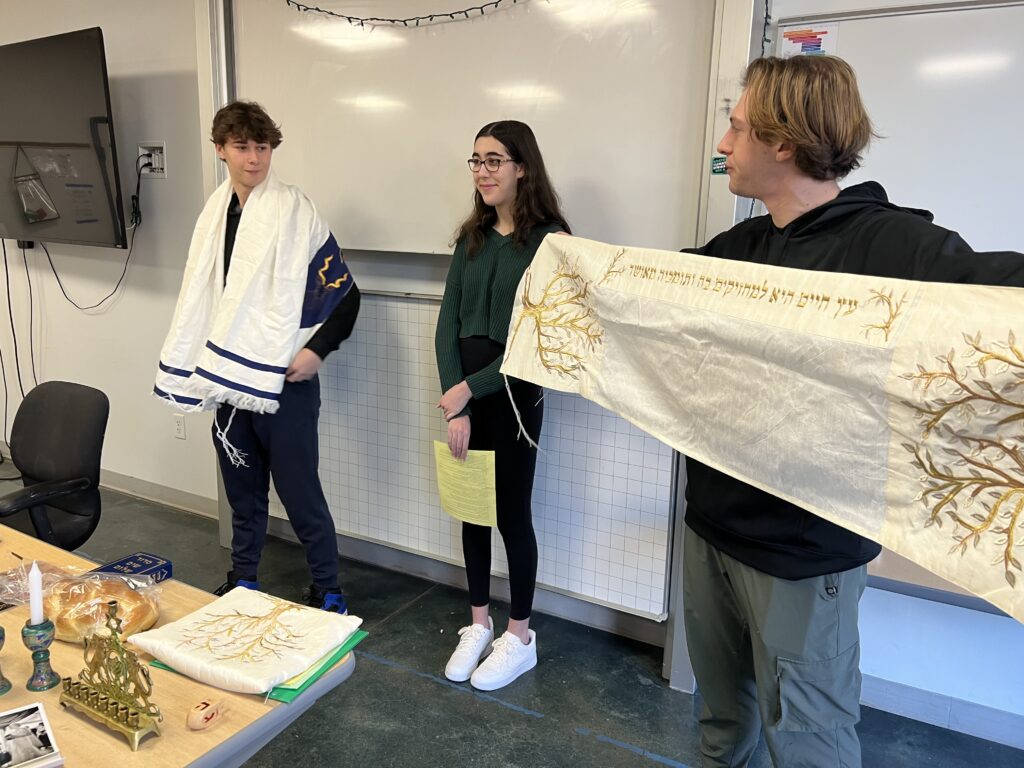The week began with many of the most prominent leaders in our Commonwealth – Governor Healey, Cardinal O’Connor, Attorney General Campbell, Mayor Wu, Treasurer Goldberg, Robert Kraft – coming together as CJP and the Foundation to Combat Antisemitism (FCAS) launched a media campaign inviting people to #StandUpToJewishHate🟦 in Massachusetts. I am grateful for the opportunity to have closed the program (you can see my remarks here) and I encourage you to visit CJP’s new Face Jewish Hate site to learn more about what you can do.
I ‘ended’ my week on Thursday visiting the FCAS operations center where I presented to a Conference of Presidents training session regarding communication responses to antisemitic events, based on our experiences here in Boston. It was good to sit down with a whole bunch of talented people who are dedicating their time to combatting antisemitism and supporting our community in moments of crisis.
There were also moments between these events that I’m thinking about as we end this week. After Monday’s launch, we headed over to the State House, where Governor Healey hosted a reception and signing ceremony for a proclamation celebrating our community’s contributions to the sciences, arts, public service, justice and so much more – as part of Jewish American Heritage Month (JAHM). This is the first time, I believe, that a Governor of Massachusetts has publicly marked this month. And mid-week I read about the JAHM event that President Biden hosted at the White House.
It should probably surprise no one that at both of these Jewish American Heritage Month events, intended to celebrate our community’s contributions to every part of American life, the focus was on antisemitism.
We can’t seem to get away from talking about antisemitism. And that’s troubling. Not least because, as most notably argued by Dara Horn in her recent book, People Love Dead Jews, it is important that we teach kids about the Holocaust as a fact of history but it is also important that we teach people about actually living Jews, our lives, culture and contributions. As she recently wrote in The Atlantic:
“To inoculate people against the myth that humans have to erase their differences in order to get along, and the related myth that Jews, because they have refused to erase their differences, are supervillains, one would have to acknowledge that these myths exist. To really shatter them, one would have to actually explain the content of Jewish identity, instead of lazily claiming that Jews are just like everyone else.”
Or, to put it another way, if we want people to stand up to antisemitism, then part of the work must be in helping people to appreciate the lived lives and vital contributions that we have uniquely made and continue to make to society as Jews. I’m reminded that in 2015 after the brutal attack on the Hyper Cacher supermarket in Paris, French President Manuel Valls said that “If 100,000 Jews leave, France will no longer be France.”
We need Americans in 2023 to also affirm that an America without Jews is no longer America – not only because of how that impacts us, the Jewish community, but also for what that would say about this country’s commitment to freedom, and because it would be a loss to no longer have a part of the diversity that has made great contributions to our nation since our founding days.
As Governor Healey’s proclamation articulates: “The strength of a society can be measured by how they protect their minority populations and celebrate their contributions.”
Which brings me, finally, to the thing I’m most proud of this week – JCRC wrapped up our pilot year of Student to Student. Groups of 3-4 Jewish high school students, representing different denominations of Judaism, visit local public and independent high schools with few, if any, Jewish students. The presentations resonate with classroom students since they are given by peers in a more informal discussion where they share their personal narratives while discussing Jewish culture and tradition. These teens are learning to talk to others about what Jewishness means to them, how they practice (or don’t), how their identity informs their families and enriches their lived experience.
In our first year, we had 12 Jewish student participants from all over Greater Boston. They did 8 presentations at 3 area schools where 270 students heard them speak. The impact will be felt far and wide as those 270 students share with friends and family what they learned.
As one teen told our staff director this week: “This was seriously one of the most enriching experiences and I feel proud to have been a part of the first cohort.”
We’ll be continuing and expanding, Student to Student in the coming year. Recruitment for the 2023-2024 school year has started and I encourage you to share our registration form with the teens in your life who might be interested.
We’ll also continue to work with all of the leaders at CJP’s gathering on Monday to encourage allies to stand up with and for our community. The work continues. This week reminded me that we are not alone in doing the work. And so, I enter Shabbat with hope – for this moment and for the future.
Shabbat Shalom,
Jeremy


